By Leen Randell
Updated: Jul 04, 2024
10 Best Herbal Decoctions For Stress
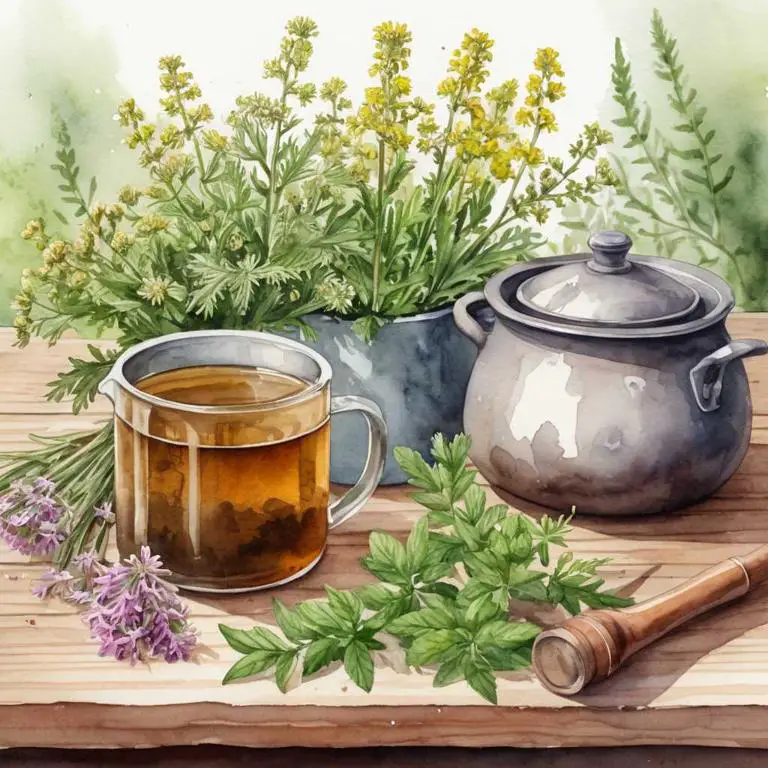
Herbal decoctions for stress are a natural and effective way to alleviate feelings of anxiety, worry, and overwhelm.
By steeping dried herbs in hot water, these decoctions release calming compounds that help regulate the nervous system, promoting relaxation and reducing symptoms of stress. Examples of stress-relieving herbal decoctions include chamomile, lavender, and valerian root, which can be enjoyed as a warm tea before bed to improve sleep quality or as an anytime pick-me-up to calm the mind and body.
By incorporating these herbal remedies into daily life, individuals can experience reduced stress levels, improved mood, and increased overall well-being.
The following article describes in detail the most important decoctions for stress, including medicinal properties, parts of herbs to use, and recipes for preparations.
- 1. Valeriana officinalis
- 2. Hypericum perforatum
- 3. Bacopa monnieri
- 4. Centella asiatica
- 5. Passiflora incarnata
- 6. Lavandula angustifolia
- 7. Melissa officinalis
- 8. Ginkgo biloba
- 9. Eleutherococcus senticosus
- 10. Avena sativa
- What is the best combination of herbal decoctions to use for stress?
- What ailments similar to stress are treated with herbal decoctions?
1. Valeriana officinalis
Valerian decoctions helps with stress because it has a calming effect on the nervous system, promoting relaxation and reducing anxiety.
The herb contains compounds that interact with GABA receptors in the brain, increasing serotonin levels and decreasing cortisol production, which can help alleviate symptoms of stress such as restlessness, insomnia, and irritability.
By promoting a sense of calm and tranquility, valerian decoctions can help individuals better cope with stress and improve their overall mood and well-being.
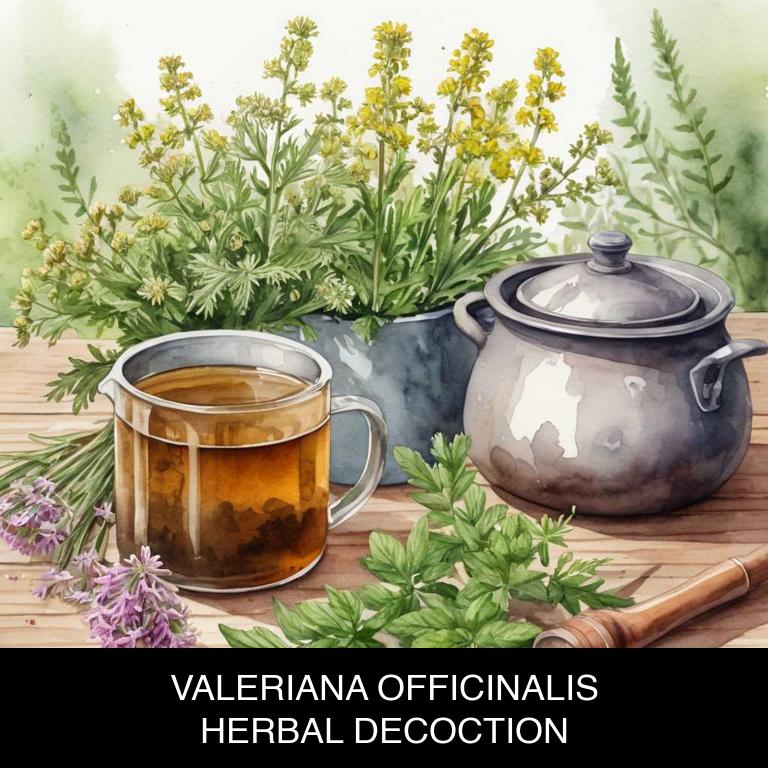
Medicinal Constituents
The list below shows the primary medicinal constituents in Valeriana officinalis decoctions that help with stress.
- Isovaleric acid: Isovaleric acid acts as a GABA receptor agonist, which helps to decrease stress and anxiety by promoting relaxation and reducing muscle tension.
- Valerenic acid: Valerenic acid is a sesquiterpene that acts as a GABA receptor antagonist, which indirectly increases GABA activity, promoting a sense of calmness and reducing stress.
- Valerenol: Valerenol is a sesquiterpene that has anxiolytic (anxiety-reducing) effects by interacting with neurotransmitters involved in stress response, such as GABA and glutamate, and promoting relaxation and calmness.
Parts Used
The list below shows the primary parts of valerian used to make decoctions for stress.
- Roots: Valerian root is the most commonly used part due to its high concentration of valerenic acids, which have a sedative effect and help alleviate stress.
- Seeds: Valerian seeds are sometimes used to make decoctions for stress relief, although less commonly than roots or rhizomes, as they contain smaller amounts of valerenic acids.
Quick Recipe
The following recipe gives a procedure to make a basic valerian for stress.
- Harvest fresh valeriana officinalis roots in late summer or early fall when they are at their peak potency.
- Clean the valeriana officinalis roots thoroughly and chop them into small pieces weighing about 20 grams.
- Boil one liter of water in a pot and add the chopped roots to steep for 10 to 15 minutes.
- Strain the decoction through a cheesecloth or a fine-mesh sieve into a bowl to remove the roots.
- Store the valeriana officinalis decoction in the refrigerator for up to 24 hours before consuming it.
2. Hypericum perforatum
St John's Wort decoctions helps with stress because it contains hyperforin, a compound that has been shown to have anxiolytic properties.
The calming effect of hyperforin can help to reduce feelings of anxiety and overwhelm, allowing individuals to feel more grounded and centered. Additionally, St John's Wort is known for its adaptogenic properties, which allow it to help the body cope with stressors in a holistic way.
By promoting relaxation and reducing cortisol levels, St John's Wort decoctions can be a valuable tool for managing stress and promoting overall well-being.
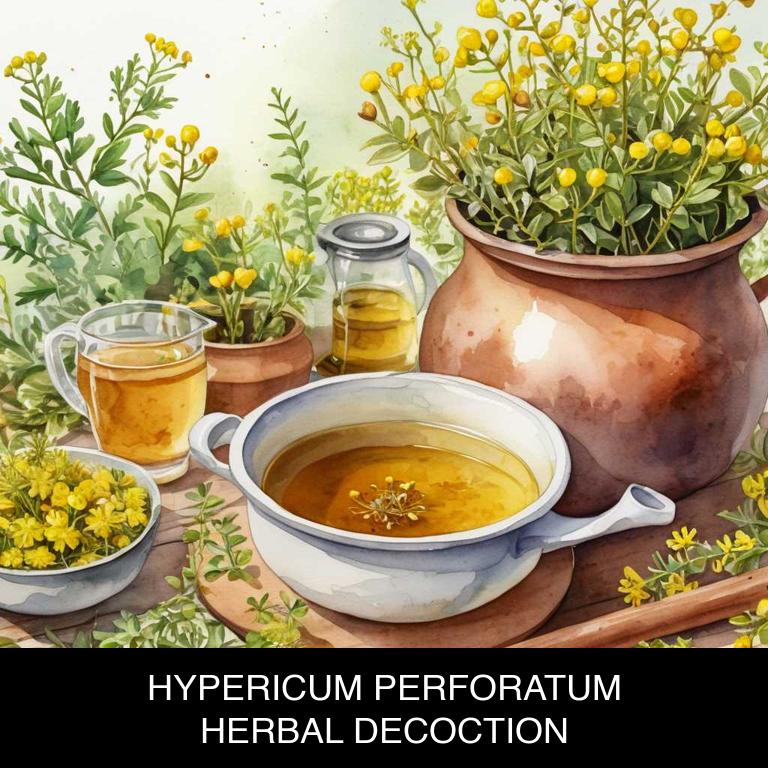
Medicinal Constituents
The list below shows the primary medicinal constituents in Hypericum perforatum decoctions that help with stress.
- Hypotensive flavonoids: These flavonoids help reduce stress by promoting relaxation and improving sleep quality due to their calming effects on the nervous system.
- Naphthodianthrones: These compounds have a neuroprotective effect, helping to reduce stress-induced anxiety and depression by modulating neurotransmitter activity and promoting a sense of well-being.
- Phenolic acids: These phenolic acids exhibit antioxidant properties, which help mitigate stress by reducing oxidative stress and inflammation, contributing to a decrease in anxiety and stress-related symptoms.
Parts Used
The list below shows the primary parts of st john's wort used to make decoctions for stress.
- Leaves: They are used due to their high flavonoid content, which provides a calming effect on the nervous system.
- Stems: They are used for their adaptogenic properties, helping the body to adapt to stress and promote balance.
- Flowers: They are used for their antidepressant and anxiolytic properties, which help to reduce stress and anxiety.
Quick Recipe
The following recipe gives a procedure to make a basic st john's wort for stress.
- Harvest 25-30 grams of aerial parts of the plant with yellow flowers in the summer months.
- Rinse the harvested plant material with water to remove any dirt or debris.
- Boil 500 milliliters of water and add the plant material for a 10 to 15 minute decoction time.
- Strain the decoction through a cheesecloth or a fine-mesh sieve to remove the solids.
- Discard the solids and store the decoction in the refrigerator for up to 24 hours.
3. Bacopa monnieri
Brahmi decoctions helps with stress because it has a calming effect on the nervous system, promoting relaxation and reducing anxiety.
The herbal extracts in brahmi, such as Bacopa monnieri, have been shown to improve memory and cognitive function, while also soothing an overactive mind. This results in a sense of calmness and clarity, allowing individuals to better cope with stress and pressure.
Regular consumption of brahmi decoctions can also enhance sleep quality, further reducing the impact of stress on overall well-being.
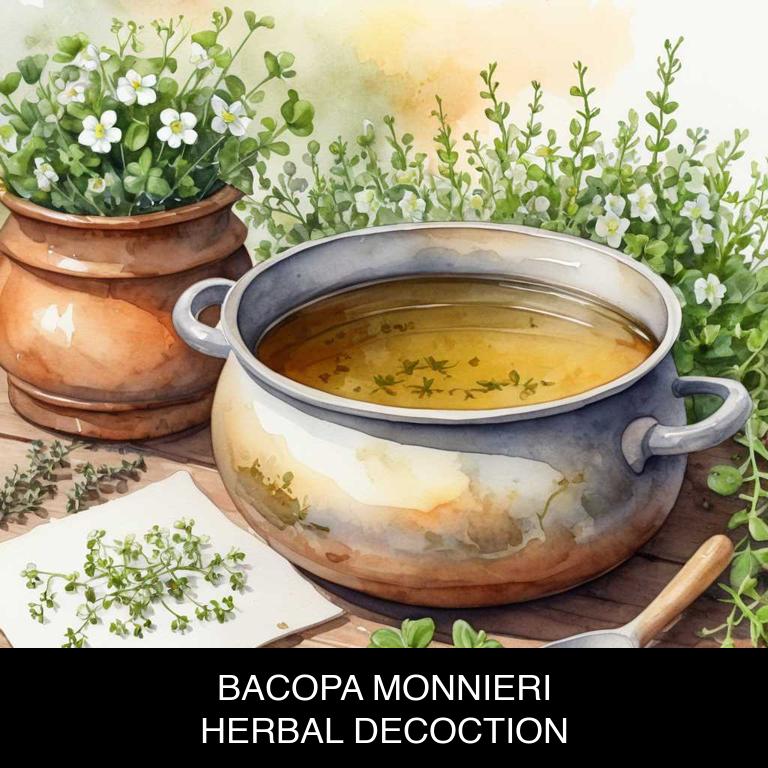
Medicinal Constituents
The list below shows the primary medicinal constituents in Bacopa monnieri decoctions that help with stress.
- Bacosides: Bacosides are a group of saponins found in Bacopa monnieri, which help alleviate stress by enhancing memory and cognitive function, thus reducing mental fatigue and stress.
- Bacopasides: Bacopasides are another group of saponins present in Bacopa monnieri, which help mitigate stress by modulating the activity of neurotransmitters like serotonin and dopamine, promoting a sense of calm and relaxation.
- Bisabolol: Bisabolol is a sesquiterpene alcohol found in Bacopa monnieri, which helps reduce stress by exhibiting anxiolytic and anti-inflammatory properties, promoting relaxation and reducing anxiety.
Parts Used
The list below shows the primary parts of brahmi used to make decoctions for stress.
- Leaves: The leaves are the most commonly used part due to their high concentration of bioactive compounds, including bacosides, which have been shown to have adaptogenic properties.
- Roots: The roots contain bacosides and other alkaloids that contribute to their stress-reducing and cognitive-enhancing effects.
- Stems: The stems, particularly the young stems, are used in some traditional preparations as they are believed to possess antioxidant and anti-inflammatory properties that help alleviate stress.
Quick Recipe
The following recipe gives a procedure to make a basic brahmi for stress.
- Harvest 100 grams of dried bacopa monnieri leaves and flowers from a trusted source.
- Weigh and mix the dried bacopa monnieri with 500 milliliters of distilled water in a saucepan.
- Boil the mixture over medium heat for 10 to 15 minutes or until the liquid reduces.
- Filter the decoction through a cheesecloth or fine mesh strainer into a clean container.
- Allow the decoction to cool and store it in the refrigerator for up to one week.
4. Centella asiatica
Asiatic pennywort decoctions helps with stress because it has been traditionally used to calm the mind and body.
The herb contains adaptogenic compounds that help regulate cortisol levels, reducing feelings of anxiety and promoting relaxation. Additionally, its antioxidant properties soothe the nervous system, reducing inflammation and calming the brain's response to stress.
Regular consumption of asiatic pennywort decoctions may also improve sleep quality, further alleviating symptoms of stress and promoting overall well-being.
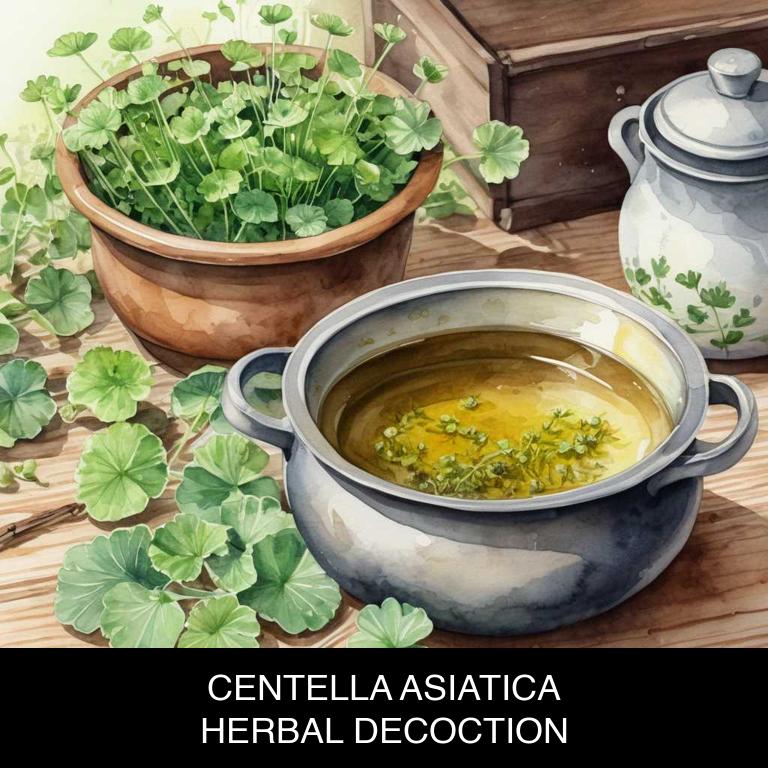
Medicinal Constituents
The list below shows the primary medicinal constituents in Centella asiatica decoctions that help with stress.
- Triterpenoids: These compounds have anti-inflammatory and antioxidant properties, which can help mitigate the physiological effects of stress on the body.
- Glycosides: These compounds have been shown to have a sedative effect on the nervous system, potentially helping to reduce anxiety and stress.
- Phenolic compounds: These compounds have antioxidant properties, which can help protect against oxidative stress and inflammation, both of which can contribute to stress-related conditions.
Parts Used
The list below shows the primary parts of asiatic pennywort used to make decoctions for stress.
- Leaves: The leaves are the most commonly used part due to their high concentration of active compounds, such as triterpenoids and saponins, which have been shown to have adaptogenic and anti-anxiety effects.
- Roots: The roots are also widely used, as they contain a higher concentration of asiatic and madecassic acids, which have been found to have anti-inflammatory and antioxidant properties that can help alleviate stress.
- Stems: The stems of Centella asiatica are sometimes used in decoctions, as they contain a mixture of triterpenoids and other compounds that may help to reduce stress and anxiety by promoting relaxation and improving sleep quality.
Quick Recipe
The following recipe gives a procedure to make a basic asiatic pennywort for stress.
- Gather 50-100 grams of dried centella asiatica leaves and flowers for the herbal decoction.
- Crush the dried herb into smaller pieces with a mortar and pestle for better extraction.
- Combine the crushed herb with 1 liter of boiling water in a saucepan and simmer for 10-15 minutes.
- Strain the herbal decoction through a cheesecloth or a fine-mesh sieve into a clean container to remove solids.
- Allow the decoction to cool and refrigerate or freeze it for later use as needed.
5. Passiflora incarnata
Maypop decoctions helps with stress because they contain a unique combination of flavonoids, alkaloids, and glycosides that work together to calm the mind and body.
The decoction's calming effects are attributed to its ability to reduce cortisol levels, alleviate anxiety and restlessness, and promote relaxation. Additionally, maypop's adaptogenic properties allow it to help the body adapt to stressors more effectively, reducing feelings of overwhelm and fatigue.
By sipping on a soothing maypop decoction, individuals can experience a sense of tranquility and peace.
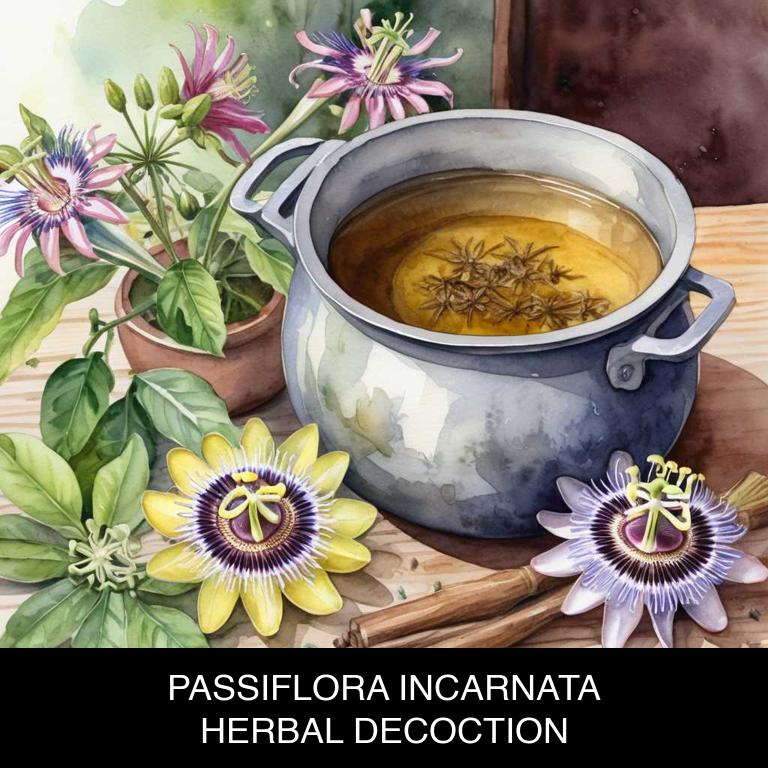
Medicinal Constituents
The list below shows the primary medicinal constituents in Passiflora incarnata decoctions that help with stress.
- Flavonoids: These compounds help with stress by reducing anxiety and promoting relaxation due to their ability to modulate neurotransmitter activity in the brain.
- Alkaloids: These compounds help with stress by acting as MAO inhibitors, which increases the levels of certain neurotransmitters like serotonin and dopamine, and also have sedative and anxiolytic properties.
- Flavonoids: These compounds help with stress by exerting anti-inflammatory and antioxidant effects, which can contribute to reducing stress and anxiety levels.
Parts Used
The list below shows the primary parts of maypop used to make decoctions for stress.
- Leaves: The leaves of Passiflora incarnata are commonly used to make decoctions for stress due to their high concentration of flavonoids and alkaloids, which have a sedative effect on the nervous system.
- Roots: The roots are another key part used to make decoctions for stress, as they contain a higher concentration of bioactive compounds, including flavonoids and glycosides, which contribute to their calming effects.
- Fruits: The fruits of Passiflora incarnata, also known as passion fruits, are used in decoctions for stress relief, as they contain a combination of flavonoids and other bioactive compounds that have a relaxing effect on the body.
Quick Recipe
The following recipe gives a procedure to make a basic maypop for stress.
- Gather 20-30 grams of dried passiflora incarnata flowers and leaves in a clean container.
- Combine the dried herbs with 1 liter of boiling water in a heat-resistant glass or ceramic pot.
- Reduce heat to low and simmer the mixture for 10-15 minutes or until the liquid has reduced slightly.
- Strain the decoction through a cheesecloth or a fine-mesh sieve into a clean container to remove the solids.
- Allow the decoction to cool and then refrigerate or freeze it for later use.
6. Lavandula angustifolia
English lavender decoctions helps with stress because it contains linalool, a natural calming agent that soothes the nervous system.
As the decoction is inhaled or ingested, it promotes relaxation and reduces anxiety by slowing down the heart rate and blood pressure.
Additionally, lavender's sweet, floral scent can calm the mind and promote a sense of tranquility, making it easier to fall asleep and stay asleep, further reducing stress and promoting overall well-being.
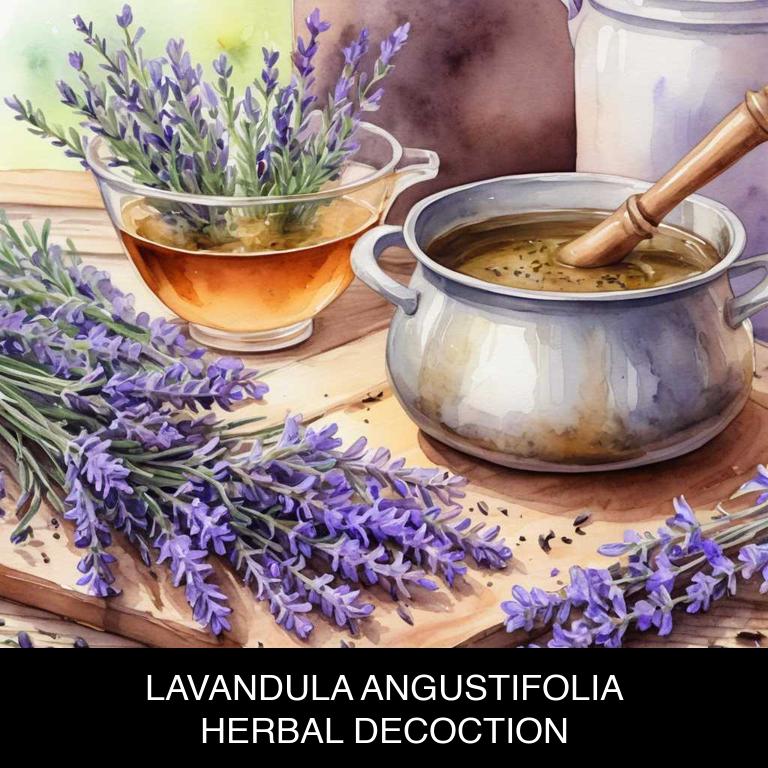
Medicinal Constituents
The list below shows the primary medicinal constituents in Lavandula angustifolia decoctions that help with stress.
- Linalool: This terpene helps with stress by promoting relaxation and reducing anxiety through its sedative and calming effects.
- Linalyl acetate: This terpene helps with stress by acting as a natural anxiolytic, reducing stress and anxiety by interacting with the brain's GABA receptors.
- Apigenin: This flavonoid phenolic compound helps with stress by acting as a natural anxiolytic and sedative, promoting relaxation and reducing anxiety through its interaction with the brain's GABA receptors.
Parts Used
The list below shows the primary parts of english lavender used to make decoctions for stress.
- Flowers: Lavandula angustifolia flowers are commonly used in decoctions for stress due to their calming and sedative properties.
- Leaves: Lavandula angustifolia leaves are often used to make decoctions for stress as they possess a gentle, soothing effect on the nervous system.
- Roots: Lavandula angustifolia roots are sometimes used to make decoctions for stress due to their earthy, grounding properties that promote relaxation.
Quick Recipe
The following recipe gives a procedure to make a basic english lavender for stress.
- Harvest 20-30 fresh lavandula angustifolia flowers in the early morning when their fragrance is most potent.
- Dry the harvested flowers in a warm and well-ventilated area for 1-2 weeks to reduce moisture.
- Weigh out 5-10 grams of dried flowers for every 250 milliliters of water for the decoction.
- Combine the weighed dried flowers with water in a saucepan and bring to a boil over high heat.
- Reduce the heat to low and simmer the mixture for 10-15 minutes to release the herbal properties.
7. Melissa officinalis
Lemon balm decoctions helps with stress because of its calming properties, which can soothe an overactive nervous system.
The herb contains rosmarinic acid, a potent antioxidant that has been shown to reduce anxiety and promote relaxation. As the decoction is ingested, it can help to calm the mind and body, reducing feelings of overwhelm and promoting a sense of tranquility.
Additionally, lemon balm's gentle sedative effects can aid in improving sleep quality, further contributing to its stress-relieving benefits.
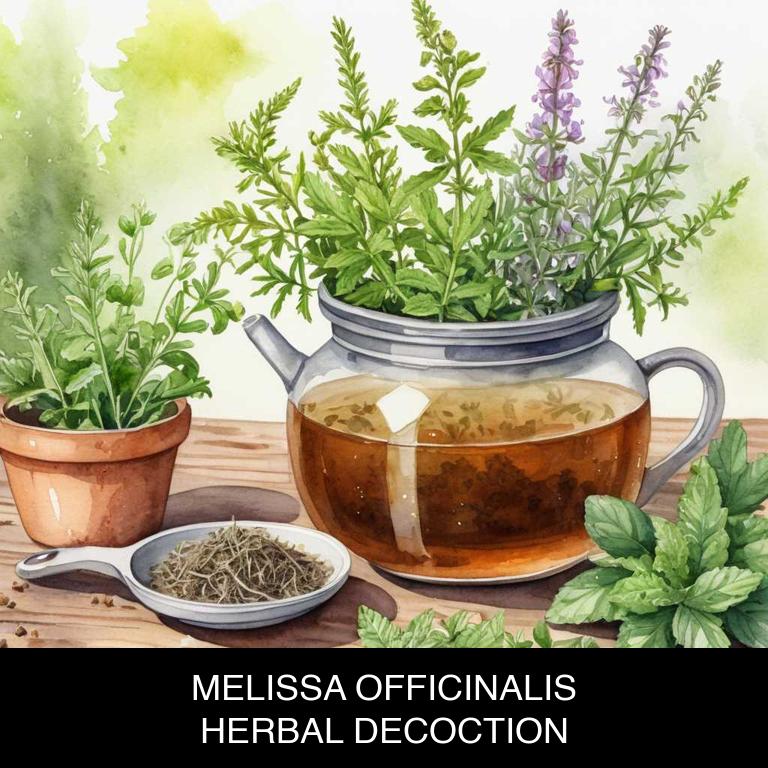
Medicinal Constituents
The list below shows the primary medicinal constituents in Melissa officinalis decoctions that help with stress.
- Rosmarinic acid: A phenolic compound that helps with stress by reducing anxiety and promoting relaxation due to its ability to inhibit the activity of stress-inducing neurotransmitters.
- Luteolin: A flavonoid that helps with stress by acting as an antioxidant and anti-inflammatory agent, which helps to mitigate the negative effects of chronic stress on the body.
- Geraniol: A terpene that helps with stress by promoting relaxation and reducing anxiety through its sedative and anxiolytic properties, which can help to calm the nervous system.
Parts Used
The list below shows the primary parts of lemon balm used to make decoctions for stress.
- Leaves: They contain high amounts of melissic acid, which contributes to their stress-relieving and anxiety-reducing properties.
- Buds: Rich in essential oils and flavonoids, the buds help to calm the nervous system and promote relaxation.
- Stems: The stems of Melissa officinalis contain a variety of flavonoids and phenolic acids, which can help to reduce stress and anxiety levels.
Quick Recipe
The following recipe gives a procedure to make a basic lemon balm for stress.
- Harvest 20 to 30 grams of melissa officinalis leaves and flowers at peak bloom for optimal potency.
- Dry the fresh melissa officinalis leaves and flowers in a single layer at 40 degrees celsius for 2 hours.
- Measure 5 grams of dried melissa officinalis leaves and flowers and add to 250 milliliters of boiling water.
- Steep the dried melissa officinalis in the boiling water for 10 to 15 minutes to release active compounds.
- Strain the decoction and discard the solids to obtain a clear herbal liquid ready for consumption.
8. Ginkgo biloba
Maidenhair tree decoctions helps with stress because they contain a unique blend of flavonoids, phenolic acids, and terpenes that have a calming effect on the nervous system.
These compounds work together to reduce cortisol levels, alleviate anxiety, and promote relaxation. The decoction's soothing properties can also help to quiet a racing mind and ease muscle tension, leading to a sense of calm and tranquility.
By promoting deep relaxation, maidenhair tree decoctions offer a natural solution for managing stress and promoting overall well-being.
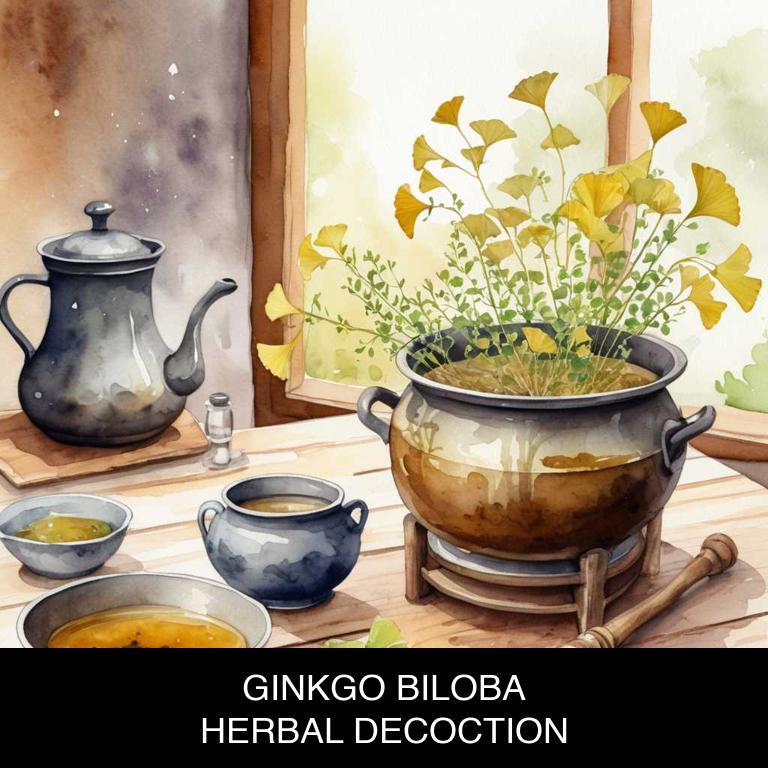
Medicinal Constituents
The list below shows the primary medicinal constituents in Ginkgo biloba decoctions that help with stress.
- Flavonoids: These compounds, particularly quercetin and kaempferol, help reduce stress by acting as antioxidants and anti-inflammatory agents, thereby protecting against cell damage caused by oxidative stress.
- Bilobalide: This sesquiterpene lactone has a sedative effect, which helps alleviate stress and anxiety by promoting relaxation and reducing excitability of the nervous system.
- Ginkgolides: Specifically, ginkgolide B has been shown to have anxiolytic properties, helping to reduce stress and anxiety by modulating the activity of neurotransmitters and inhibiting the release of excitatory neurotransmitters.
Parts Used
The list below shows the primary parts of maidenhair tree used to make decoctions for stress.
- Leaves: They are the primary part used in herbal medicine due to their high flavonoid and terpene content, which is believed to contribute to their stress-relieving properties.
- Buds: Buds of the Ginkgo biloba tree are used in traditional medicine to reduce stress and anxiety due to their unique chemical composition that is thought to promote relaxation.
- Seeds: Ginkgo biloba seeds are also used in herbal decoctions to help alleviate stress and anxiety, possibly due to their high content of ginkgolides, which have been shown to have a positive effect on mental well-being.
Quick Recipe
The following recipe gives a procedure to make a basic maidenhair tree for stress.
- Measure 1 to 2 grams of dried ginkgo biloba leaves or 2 to 4 grams of fresh leaves per cup of water.
- Combine the measured ginkgo biloba leaves with 1 cup of boiling water in a heat-resistant glass or ceramic container.
- Reduce the heat to a simmer and let the mixture steep for 10 to 15 minutes or 30 minutes for a stronger decoction.
- Strain the decoction through a cheesecloth or a fine-mesh sieve into a clean container to remove the solids.
- Store the prepared ginkgo biloba decoction in the refrigerator for up to 24 hours and consume 1 to 2 cups per day.
9. Eleutherococcus senticosus
Siberian ginseng decoctions helps with stress because it has a unique ability to adapt to an individual's body chemistry, providing a sense of balance and harmony.
The herb works by stimulating the body's natural response to stress, allowing it to build resilience and coping mechanisms. This can help reduce feelings of anxiety and fatigue, promoting a sense of calm and well-being.
Additionally, Siberian ginseng decoctions may also improve sleep quality and enhance cognitive function, further alleviating symptoms of stress and promoting overall mental health.
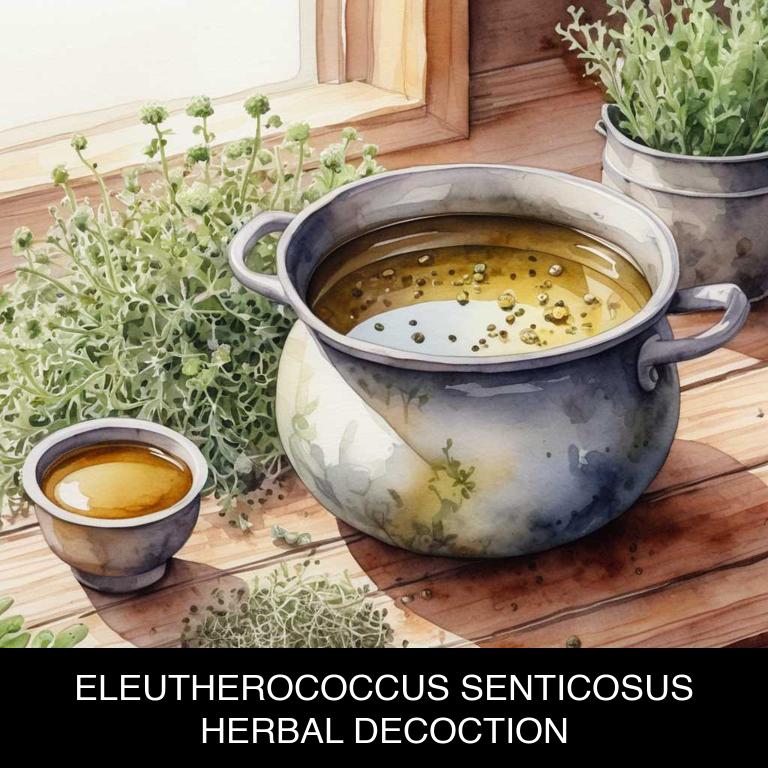
Medicinal Constituents
The list below shows the primary medicinal constituents in Eleutherococcus senticosus decoctions that help with stress.
- Eleutherosides: These saponin-type compounds, particularly eleutheroside E and B, are believed to help with stress by modulating the body's stress response system and improving adaptability to physical and emotional stressors.
- Aldosterone-inhibiting compounds: Eleutherococcus senticosus decoctions contain compounds that inhibit the production of aldosterone, a hormone associated with stress, thereby helping to alleviate stress and anxiety.
- Polysaccharides: The polysaccharides present in Eleutherococcus senticosus decoctions may stimulate the immune system and improve its response to stress, helping to mitigate the negative effects of stress on overall health.
Parts Used
The list below shows the primary parts of siberian ginseng used to make decoctions for stress.
- Roots: Rich in bioactive compounds, they are the primary source of Eleutherococcus senticosus's medicinal properties.
- Leaves: Used in traditional medicine, they contain some of the plant's adaptogenic properties and antioxidants.
- Stems: Also used in traditional medicine, they are believed to have some of the plant's adaptogenic and stress-relieving properties.
Quick Recipe
The following recipe gives a procedure to make a basic siberian ginseng for stress.
- Gather 1-2 cups of dried root of eleutherococcus senticosus, harvested in the fall season.
- Grind the dried root into a fine powder to facilitate extraction of active compounds.
- Combine 1-2 teaspoons of the ground root powder with 1 quart of boiling water in a saucepan.
- Steep the mixture for 30-60 minutes to allow for the extraction of bioactive constituents.
- Strain the mixture through a cheesecloth or fine-mesh sieve into a container to remove the solids.
10. Avena sativa
Oats decoctions helps with stress because they contain natural soothing compounds that calm the nervous system, promoting relaxation and reducing anxiety.
The gentle warmth of the decoction can help to melt away tension in the body, while the calming properties of the herbs work to quiet the mind.
As the steam rises, it can envelop the senses, creating a sense of tranquility and peace, helping to ease stress and promote a restful night's sleep.
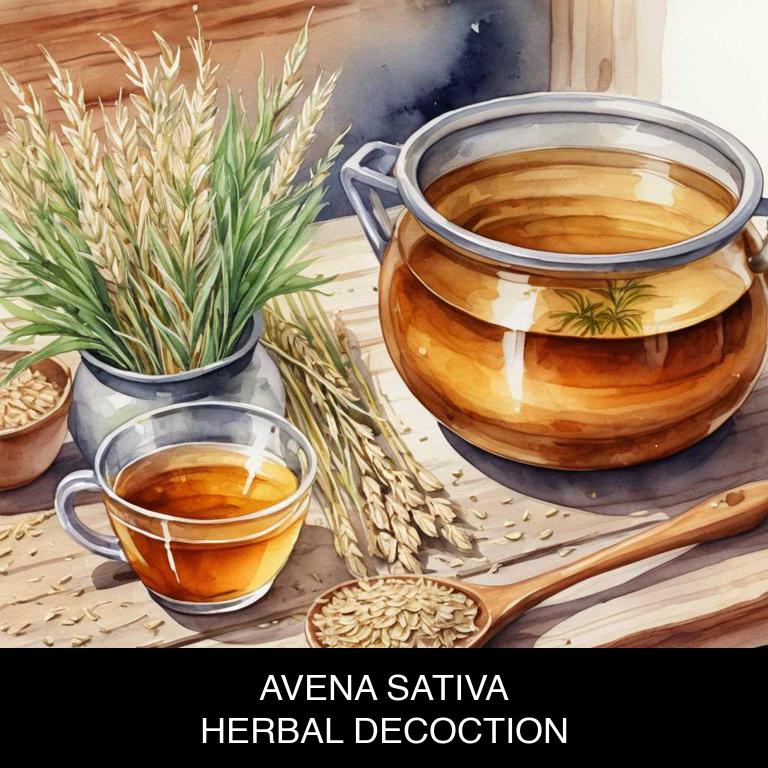
Medicinal Constituents
The list below shows the primary medicinal constituents in Avena sativa decoctions that help with stress.
- Avenacosides: These saponin glycosides in Avena sativa decoctions have anti-anxiety and sedative properties, helping to reduce stress and promote relaxation.
- Fatty acids: The unsaturated fatty acids present in Avena sativa, such as oleic and linoleic acid, have anxiolytic and mood-stabilizing effects, contributing to stress relief.
- Oligopeptides: These bioactive peptides in Avena sativa decoctions have neuroprotective and adaptogenic properties, helping to improve stress resilience and overall mental well-being.
Parts Used
The list below shows the primary parts of oats used to make decoctions for stress.
- Seeds: The seeds are used due to their high content of tryptophan, an amino acid that is converted into serotonin in the body, helping to reduce stress and promote relaxation.
- Roots: The roots are used as they contain a range of bioactive compounds, including saponins, flavonoids, and phenolic acids, which have been shown to have anxiolytic and anti-inflammatory effects.
- Leaves: The leaves are used as they are a rich source of flavonoids, phenolic acids, and saponins, which have been found to have a calming effect on the nervous system and help to reduce stress and anxiety.
Quick Recipe
The following recipe gives a procedure to make a basic oats for stress.
- Harvest avena sativa roots and rhizomes by digging them up from a sunny location in the fall.
- Clean the avena sativa roots and rhizomes by washing them in cold running water for 10 minutes.
- Chop the avena sativa roots and rhizomes into small pieces to increase their surface area for infusion.
- Combine 1 ounce of chopped avena sativa with 2 cups of water in a saucepan and bring to a boil.
- Simmer the avena sativa decoction for 30 minutes to 1 hour to release its active compounds.
What is the best combination of herbal decoctions to use for stress?
The best combination of herbal decoctions that help with stress is a blend of calming and adaptogenic herbs.
Ashwagandha root decoction, known for its stress-reducing properties, pairs well with lavender and chamomile to promote relaxation. Adding valerian root decoction enhances sleep quality, while lemon balm and passionflower help to calm the mind. This harmonious blend helps to regulate cortisol levels, reduces anxiety, and promotes overall well-being.
Regular consumption of this decoction combination can lead to a more balanced and peaceful life.
What ailments similar to stress are treated with herbal decoctions?
Ailments similar to stress/decoctions.html">stress/decoctions.html">stress that are treated with herbal decoctions are anxiety, insomnia, and depression.
Herbs like Ashwagandha, Holy Basil, and Valerian root help to calm the mind and body, promoting relaxation and reducing symptoms of these conditions. Decoctions made from these herbs can be consumed as a tea or added to bath water for a soothing and calming effect.
Additionally, they may also help alleviate symptoms of restlessness, irritability, and fatigue associated with stress and anxiety disorders.